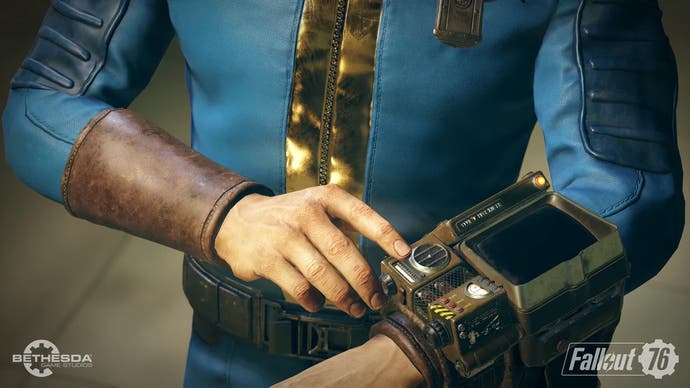Fallout is a warning from the oddball future of wearables
Pipped to the post.
When Fallout 4 came out with a full-scale Pip-Boy model, back in 2015, I'm deeply ashamed to remind you that we made Johnny Chiodini spend a week wearing it. How did it go? Oh my. Let's just say this: over the course of that week the Pip-Boy got mould and also broke, but Johnny still had the worst half of the bargain.
What I'm even more ashamed to say is that, somehow, while my colleague was going through all that for our enjoyment and education, I had thoroughly missed the point that the Pip-Boy is just another piece of pointed satire in a game series that is full of the stuff. Anyway, this week I finally made the obvious connection - and not because of the fact that Fallout just became a TV series.
The thing that finally tipped me off was a review in the Verge of the new AI pin from Humane. It's an AI-powered device that you clip to your top where, according to the Verge, it gets really hot and burns through battery while not doing very much. I love the Verge's write-up because, like me, the writer is sort of besotted with wearables, even though wearables have so far turned out to be useless and silly. The idea is so brilliant and zany - a computer that you snap onto your clothes or your face! - that I dearly want it to work.
And I suspect it will one day. I carry a phone around in my pocket that is really a computer, and I'm a hearing aid user, which means I'm already used to clipping things onto me. My hearing aid is a life-changer, and I barely know I'm wearing it anymore. Equally, I have an acquaintance who's diabetic and has a little device that allows them to tweak their insulin levels on the go. Again, it changes everything for them. But - let's stick with this - both of these devices are pretty much the reverse of the Humane pin as it currently stands. They're cheap, they're almost invisible, and they do what they're meant to.
It was impossible for me to read the Humane review without thinking of Johnny, and without thinking of all those people wandering around the Wasteland with this huge gadget on their arm. I've played the Fallout games a bit and the Pip-Boy is actually sort of useful in the game. Amongst other things, it's the menu system. But I now realise it's more than useful, it's richly thematic.
And it's always been thematic. I've just read a USGamer piece on the Pip-Boy that's now available on VG247, in which the wonderful Khee Hoon Chan speaks to the people who created the Pip-Boy. I had forgotten that the original Pip-Boy was not worn on the arm but was a sort of ugly-beautiful tablet computer.

Testify! "I just really like the look of old, clunky technology," the Pip-Boy's designer Leonard Boyarsky explains in the piece, adding: "To be honest, I don't remember if we came up with the '50s theme - it was [close to] 25 years ago - but if we did, we may have streamlined [the Pip-Boy] a little bit more."
The USGamer article also addresses some of the more thematic intentions at work. "The Pip-Boy's bulkiness also served a secondary purpose," it says. "It's symbolic of an irreparable world torn apart by war and conflict.
"This was also just my way of creating a feeling that the world wasn't quite working, like you can see the seams [of this universe]," Boyarsky said. "Whereas if you had sleek technology, it will feel very functional, or to be without problems. I wanted our stuff to feel like maybe it wasn't all that dependable, like it's kind of hacked together to a certain degree."
This is fascinating, because even though Bethesda then streamlined the device a little, they also stuck it on the player's arm. This is the point it moved from being technology to being a genuine wearable, the point at which it had to represent all the hopes of people everywhere who ever dreamed of a very small, very hot laptop that also ruined the seams of their clothing.

And this is something you see very clearly in the Fallout TV series. Pip-Boys add an instant feeling of comedy - or is it social horror? - to every scene in which they appear. People will be living their lives, fixing pipes, practicing with weapons, just, you know, chillin' on the deck, and they'll have this huge thing clamped onto them. And it's far from a benign presence. The series' opening episode quickly draws a connection between the pre-Wasteland world, in which almost nobody notices a nuclear bomb going off outside because they're indoors watching television, and the era of the Vaults, in which a main character makes a petition to an advisory board, and is answered by three officials prodding their Pip-Boys rather than speaking - before her own Pip-Boy informs her of their decision.
This stuff is, interestingly, exactly the kind of stuff that the AI pin from Humane was meant to help with. According to that Verge piece, it's technology that's meant to stop you looking at your phone so much. Instead, you have this little bobbin on your top that takes a long time to answer simple questions, ignores phone calls, lies about Beyonce and steadily gets warmer and warmer.
This is possibly satire too, of course: expensive technology - with a monthly data contract - put in place to free us from our existing expensive technology with its own monthly data contracts. I'm not going to say this will never work - and the Verge piece talks a lot about the things Humane is currently working on to improve things. (Worth noting, the Verge also published this rather knowing "review" of the Fallout Pip-Boy too.) Again, I think this stuff will work one day. After all, my hearing aid, in a previous era, would have been a small trumpet that I would carry around with me and shove in my ear during conversations, and look how that turned out. (Yes, part of me does want an ear trumpet.) But it is a reminder of how sharp Fallout's designers have been with the Pip-Boy over the years. Technology promises it will get out of the way, but has a habit of backing further into the spotlight. Just ask Johnny.



.png?width=291&height=164&fit=crop&quality=80&format=jpg&auto=webp)






